Willie Bosket — Being Bad — Crime Library
On Sunday, March 19, 1978, a fifteen year-old boy named Willie Bosket was riding the subways, looking for someone to rob. He’d been in and out of court on various charges since he was nine, and he’d learned that there was little force behind the dispositions rendered in Manhattan’s Family Court.
He faced a hearing on attempted robbery, and knew that a loving couple had started proceedings to adopt him as a foster child, since his own father was in prison and his mother had little to do with him. Because the state needed time to process the adoption papers, Willie was out roaming around.
One evening, he’d found $380 in the wallet of a sleeping passenger on the subway train and he’d used it to buy a gun from Charles, the man currently living with his mother in Harlem-a man who told him that using a gun would get him respect on the streets. Charles sold him a .22 for $65. Willie bought a holster and strapped it to his leg. Wearing it made him feel powerful.
At 5:30 in the afternoon that Sunday, he found himself alone with another rider on a number 3 IRT train. The passenger, a middle-aged man wearing a gold digital watch, was asleep. Willie kicked him, and getting no response, began to work the watch off his wrist. He noticed that the man was wearing pink sunglasses as well, which reminded Willie of a counselor from juvenile detention whom he had despised. It irritated him.
The man suddenly opened his eyes, and Willie reached for his gun and shot him through the right eye of the sunglasses, piercing his brain. Then the passenger threw up his hands in defense and screamed. Willie panicked at the thought that he might not die, so he shot him again in the temple. The man fell back against the wall and then slumped to the floor.
As the train pulled up to its last stop near Yankee Stadium, Willie took his victim’s watch, found fifteen dollars in his pants pocket, and also slipped a ring off his finger, which he sold on his way home for twenty dollars.
The shooting victim was identified as Noel Perez, 44, who worked in a hospital and lived by himself. The papers called it a random shooting with no apparent motive. Little could be done to find the culprit.
For Willie, the fatal encounter was his destiny. He’d lived much of his life toward this moment, to know what it was like to take a life. Even more empowering was the fact that no one saw him. He even told his sister what he had done, yet there were no immediate consequences. He’d gotten away with murder and felt that it was no big thing to kill a man. Now he was “bad,” as bad as he’d told everyone he’d be one day.
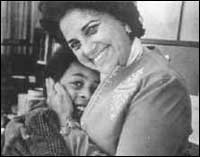
Willie was living out a legacy that had come down to him from a history of violence rooted in one of the most savage counties in the south: Edgefield County, South Carolina.
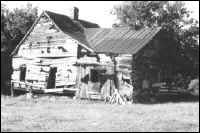
In 1760, the Cherokee tribe massacred scores of settlers, and homeless men soon formed into outlaw gangs that abducted women and tortured wealthy planters the get their valuables. The first organized vigilante group, known as the Regulators, started here, introducing yet their own strain of abuse and sadism. The American Revolution in 1775 inspired backwoods violence by cavalry under the command of “Bloody Bill” Cunningham, who raided farms and massacred settlers. The constant fighting left people in “Bloody Edgefield”-which had double the state’s average murder ratewith a callous attitude toward violence. A gentleman’s warrior code arose that involved fighting for one’s honor. Dueling became a cherished part of the culture, despite being outlawed. Edgefield county came to be known as a place that had more daredevils and adventurers than any county in the state, perhaps in the country. The Edgefield character was reputed to be intense and fiery. Violence was part of this region’s heritage.
Willie’s ancestors were slaves in this county, at Mount Willing. The first Bosket appears on voting records in 1868, after the slaves were freed. The family name came from an Edgefield planter, John Bauskett. In 1850, he owned two hundred and twenty-one African slaves. He acquired Ruben, who took his master’s last name, which eventually became Bosket. Ruben was sold to Francis Pickens, who owned over five hundred slaves. He married and his son, Aaron, was Willie’s great-great-grandfather. Aaron was sold away from his family when he was only ten to a hot-headed master who was among those responsible for the deepening anger among the slaves toward their white masters.
Aaron was freed in 1865 at the age of 17 and he signed a labor contract with a white planter in the area, to work in exchange for some of the crop. He married, but life proved to be a constant struggle. He felt that the white men were swindling him, but he understood the necessity to accommodate them. Around him, the Ku Klux Klan were beginning to harass freed slaves and he wanted to take no chances. He had a son, Clifton, who was called Pud.
This boy grew up with a streak of pride and resistance. He wanted respect. Reputation was everything, and he considered himself the white man’s equal. Pud was gregarious and persuasive, and since his mother’s father had been white, he inherited a light complexion. When he was twenty-one and working as a share-cropper in the cotton fields, the landlord decided to whip him for being a “bad nigger.” Pud would have none of that, so he grabbed the whip, snatching it away, and pulled the man form his wagon. Then he walked away. Nevertheless, he had gained a reputation that day as someone to fear.
When he was short of money one day, Pud broke into two stores, taking twelve dollars. He was arrested, but escaped. Three weeks later, the sheriff recaptured him and he was sentenced to a year of hard labor on the county chain gang. When he completed his time, he returned to his community as a hero-a “bad man.” He was getting the respect he wanted, and he was one of a new breed of African-American folk heroes, the black bad man. They could stand up to a harsh, punitive world and not only survive but dish it out as well. They were an “explosion of fury and futility.”
Pud became increasingly more violent, cutting people with a knife when they insulted him, but he also married and had three sons, William, Freddie Lee, and James. While they were young, Pud died in a car accident. Nevertheless, they heard their father’s exploits recounted in stories, learning the Bosket reputation and recognizing that it now lay on them to defend it. he got respect, and so should they.
James noticed that when he mentioned he was a Bosket, people backed away. Their fear made him feel powerful. He wanted to emulate his father, claiming that he was going to grow up to be “bad.” Soon he carried a knife and took to drinking. He developed seizures as well, and the alcohol made him violent. He once shot at his young wife, Marie, who ran from the house. She complained that he was cruel and abusive and she went to court to request support for herself and her baby, Willie James, known as Butch. Rather than pay her, James left the state. He was not going to let the white man’s court interfere with his life. He began to indulge in a series of petty robberies, getting arrested in New Jersey and winding up in jail.
Marie decided to head north as well. At the age of seventeen, she left her baby with Frances, her mother-in-law and went to Chicago.
Young Butch, left mostly on his own, learned early to be a hustler. His grandmother didn’t feed him so he did anything he could for food. Frances beat him all the time, seeing the devil in him, but it did not stop him from stealing. It only hardened him and he soon went to live out in the streets. He understood the need to fight to survive, and there in the south, fighting was socially approved. Honor was still important and Butch had no human attachments to soften his character. He became the toughest boy on his street.
Then James returned home and he often beat Butch badly with his belt. Marie, too, came back, but was not allowed in, so she headed to New York. When eight year-old Butch was arrested for robbing a woman at knifepoint, a probation officer saved him from reformatory by taking him to New York to be with his mother. Marie was not happy to see him and made him feel that he was a burden. He learned to ride the subway all day to avoid both school and home. Marie finally kicked him out and he was taken to juvenile court, and then sent to an institution. They could not handle him and sent him back to the court. He was then sent to Wiltwyck School for Boys.
The place was actually good for him. It was the first place where he formed attachments. He also learned to read.
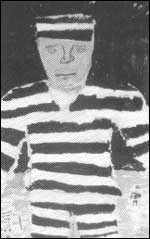
of a Prisonar, from Wiltwyck
However, when Butch was fourteen, he was sent to live with his father, who had moved to New York after serving jail time for armed robbery. James began to beat him and punch him again, undoing all the benefits from the reform school, and Butch was ready now to fight back.
By this time, he had developed hallucinations and was eventually diagnosed with childhood schizophrenia, which was later changed to Conduct Disorder. They considered him on his way to becoming a psychopath, a person with no empathy and diminished control over his impulses. However, he scored in the 130 IQ range, considerably above average, and he had the advantage of being handsome.
Soon Butch was arrested for armed robbery and got five years in prison, the same as his father had before him. He was constantly in fights and was diagnosed as having an antisocial personality disorder, with a poor prognosis.
When he got out, he married Laura Roane, and they were soon expecting a baby, whom they wanted to name Willie. They went to Milwaukee to start a new life, but it ended in tragedy. Butch went to pawn some pornographic photos, and when the pawn shop owner tried to cheat him, he exploded. He stabbed the man six times, killing him, and then with great frenzy repeatedly stabbed another man who was merely a customer in the shop. When he realized what he’d done, he fled the premises and left Milwaukee. Eventually he was caught and returned to Wisconsin, leaving his pregnant and destitute wife to fend for herself. Butch was sentenced to life in prison. He had made the most horrible mistake he could imagine, and he had no idea how it would affect his son, soon to be born.
On Thursday, March 23, 1978, Willie’s cousin, Herman Spates, came to wake him up. Willie strapped on his gun and holster and proposed they go get some money. It was only four days since he had killed a man and he was feeling tough. They walked over to the Number 3 subway train at 148th Street and Lexington Avenue.
In the yard, they spotted a motorman named Anthony Lamorte, from Brooklyn. He had a CB radio that the boys believed would bring them one hundred dollars on the street. They followed him.
Lamorte was nearing the end of his shift, which involved cutting or adding train cars as demanded, and he spotted Willie and Herman where they didn’t belong.
“You’re not supposed to be here,” he said. “Get the hell out.”
Willie was not going to be told what to do by some white man. That was the enemy. “Why don’t you come down here and make us get out?” he challenged.
Lamorte climbed down the steps of the car he was in and approached them. He thought that Willie looked baby-faced, much too young to be getting into trouble. When he was about thirty feet away, Willie pulled out his gun and demanded the man’s radio and money.
Lamorte, sensing something bad, turned back to the subway car. He heard the boys running toward him, and then came a popping sound. He felt a numbness in his back and right shoulder. Shortly afterward, he heard the boys running away. He walked to the dispatcher’s office and said he thought that he had been shot.
Willie and Herman got out fast, but over the course of the next three nights, pulled three more violent robberies. They got twelve dollars from a man they had kicked down the steps to the A train station. Next, they shot 57 year-old Matthew Connolly in the hip when he resisted them. Willie was grabbed and searched, but the Transit Authority patrolman completely missed the gun he’d hid in his pants. When the victim failed to identify him, Willie felt invincible. He knew he was smarter than the law and could get away with anything.
On Monday, March 27th, Willie and Herman jumped the turnstile on 135th Street and entered the last car of the uptown train. There was only one passenger on it, a Hispanic man in his late thirties.
Willie posted Herman at the front of the car, knowing the man could not get out at the next stop because of the short platform. He took out his gun and demanded the man’s money.
“I ain’t got any,” the man told them.
That was the wrong thing to say. Willie pulled the trigger. The man slid from his seat to the floor, his blood pooling out around him. Willie went through his pockets and found two dollars. The man’s wallet revealed his name: Moises Perez (no relation to Willie’s first victim).
Willie flung the wallet in the trash and walked back home with Herman, laughing over his exploit. He felt like a big-time killer now, a Bad Man. When it made the front pages of the next day’s newspaper, he proudly showed his sister.
Ironically, that same day the Division for Youth in Albany had given final approval for Willie to be adopted as a foster child by a couple he had hoped to live with. All of that was now to change, and it was not only Willie’s life that would be dramatically altered, but the lives of every kid his age in New York who committed a violent crime.
Detective Martin Davin of the Sixth Homicide Zone investigated the recent subway killings. There was talk of a serial killer on the loose, and he knew that meant more pressure on him. The fact that Moises Perez’s wallet had been found indicated that the killer might be from the neighborhood. A computer search brought up Willie Bosket and Herman Spates, picked up for the shooting of Matthew Connolly. He had not been able to identify them, so they had been released, but since this pair had repeat arrests, Davin thought they should be checked out.
Willie was a juvenile at 15, and Davin knew he’d have to be careful. He decided to go after Herman, who was 17. Nevertheless, some ambitious transit cops grabbed Willie on the street and brought him in. That meant he had to find Herman quick, because holding a juvenile too long meant the case might be thrown out. They found Herman with his probation officer. He willingly accompanied Davin, who told him that they knew where he was on the day of the fatal shooting. Herman said he was asleep in a movie theater, but they told him that Willie had already given him up. Herman then insisted that it was Willie who shot the man. He also spilled the beans on the previous murder and revealed the whereabouts of the gun.
The detectives got a search warrant and ran into Willie’s mother on her way out the door. She reluctantly showed them where the gun was. Then she accompanied them to question Willie. Immediately he threatened the district attorney and then blundered by admitting he had the gun.
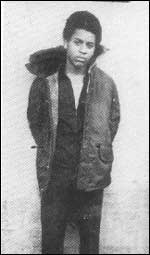
his arrest.
In the past, Willie’s case had always gone to Family Court. His various crimes since the age of nine had been dealt with by sending him to reformatories. However, with the growing rise of juvenile arrests in the mid-seventies, the Family Court system was being revised. In 1976, New York passed the Juvenile Justice Reform Act, which created a new category of juvenile crime, the “designated felony.” This allowed kids as young as fourteen who committed violent acts to be given longer sentences than the traditional limit of eighteen months. They could now be sent to a training school for three to five years. The court was no longer to act as a parent, but to keep the protection of the community in mind as well. District attorneys now came into these court sessions.
Assistant D. A. Robert Silbering acquired Willie’s case. They had the gun and a ballistics test that linked it to the murder, but Silbering worried that they had no witnesses and no confession. Anthony Lamorte picked Willie out of a lineup, and the D.A. pressured Herman to testify against his cousin in exchange for a lighter sentence.
Even with all of that, there was not much a court could do to a juvenile, despite his long record and a clear indication that he might very well kill again. Willie had made the claim many times to juvenile authorities that his father was a killer and he was going to be one, too. Violence, he had learned, won him respect. Added to that was a mother who had distanced herself from her son, believing that he was just like his father and would come to no good. Growing up, he learned to throw temper tantrums, to hit his teachers, to steal, and in general to live life on his own terms. His grandfather had sexually abused him when he was nine. He repeatedly told people he did not care if he lived, and it seemed that he had nothing to lose. Nothing meant anything to him. He never even had to face up to any of his criminal acts against others, because a juvenile was considered incapable of criminal intent, so he easily maneuvered his way through the idealistic cracks of the system and always ended up back home. Violence became a sport that he was good at.
By the time he was eleven, he was an angry, hostile, homicidal boy whom no one could reach. He showed grandiosity, narcissism, poor impulse control, infantile omnipotence, and a history of suicide attempts and daily threats against others. His diagnostic evaluation was Antisocial Behavior, just steps away from the Antisocial Personality Disorder diagnosis slapped on his father. Willie was not psychotic, but he was certainly dangerous. Even as young as he was at the time, it was predicted that he would eventually kill someone.
With this background and whatever evidence he could gather, Silbering prepared to go to court.
The trial for Willie Bosket was held in the Family Court building on Lafayette Street in lower Manhattan. He was charged with three separate felonies-two counts of murder and one of attempted murder, which meant three different trials.
Judge Edith Miller had seen Willie before and she thought him too bright to be in so much trouble. Yet this time in court he was belligerent to the point of needing to be restrained, and his foul-mouthed manner surprised her. What disturbed her more was his lack of moral sense and his insensitivity to the victims’ families. He forced the widow of Moises Perez to testify that it was indeed her husband’s body that she had identified. Even at the Spofford Juvenile Center where he was confined, he had stabbed another boy with a fork, hit a counselor in the face, and choked a psychiatrist. Later he bragged that, though he was only fifteen, he had committed over two thousand crimes, twenty-five of them stabbings.
Willie approached his trials with an air of total detachment. He did not realize that he was now going through a new procedure, different from only two years earlier, and things were fairly serious. He even thought he could skip the trial if he wanted to, but not by pleading guilty. As the trials went along, Willie finally tired of it all and impulsively told his surprised lawyer to enter a plea of guilty. Silbering insisted he must plead to all three counts, which he did. The sentencing date was set, and Silbering tried to think of ways to get more than the maximum five years for these crimes. However, with no precedent, there was nothing he could do.
Willie was placed with the Division of Youth for a maximum sentence of five years. By the time he was twenty-one, he would be free.
Two days after Willie was sentenced in a trial that had created massive local publicity, Governor Hugh Carey was flying from Manhattan to Rochester to make a campaign appearance. His Republican opponent in that election year was attacking him for being soft on crime and was proposing a tough new law that would permit juveniles to be tried as adults for violent crimes like rape and murder.
Carey, a liberal Democrat, had resisted such a strong reaction. He thought it was too drastic, although he knew there were those in his party who supported it along with Republicans statewide.
That morning, as he read the paper, he spotted the press report on Willie’s sentence, which should have been confidential, but obviously had been leaked. One account in the Daily News quoted Herman Spates saying that Willie killed because “he got a kick out of blowing them away.” This newspaper also had uncovered the fact that one of Willie’s assigned social workers had warned the Division of Youth officials that he was dangerous.
Carey acted at once to this horrifying story. It seemed that he had suddenly realized that some kids were not so easily rehabilitated, as was the primary focus of Family Court, with light or nonexistent sentences. Carey shifted his position and called a mid-air press conference. He was going to support trying violent juveniles as adults, swearing that Willie Bosket would never walk the streets again.
“There was a breakdown of the system,” he told reporters, “and it is really on the doorstep of the Division for Youth. The blame is squarely on the shoulders of the department.”
The Division of Youth, for their part, felt they had done all that they could. There were no programs or facilities for a child like Willie, who had such an explosive temperament.
A week later, Carey called the legislature back to Albany for a special session, passing the Juvenile Offender Act of 1978. Under its terms, kids as young as thirteen could be tried in adult court for murder and would face the same penalties. This law reversed the tradition of the past 150 years that children were malleable and could be rehabilitated and saved. There was now an attitude that there were truly bad kids and they should be locked away from society. It was too late for Willie to be tried under this law, but it certainly changed things for others his age.
With the passage of this law, New York became the first state to take this step. Yet as juvenile crime statistics worsened around the country, other states followed suite. The press, the public, and prosecutors in New York took to calling it the Willie Bosket law. He got the notoriety he wanted, but not quite in the way he had imagined when he bragged to everyone that he would become a killer just like his dad.
In fact, Willie’s father, Butch, was not very happy to hear the Willie was trying to follow in his footsteps. Although he had escaped from prison in Wisconsin, he had been recaptured after robbing several banks in New York. He was sent to the federal penitentiary in Leavenworth, Kansas.
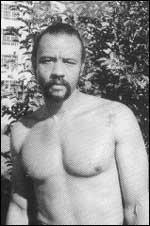
worth prison
Butch had tried very hard to find opportunities in prison to better himself so he could show the parole board that he was worth another look. He had a cellmate who was an intellectual and who supported Butch’s efforts to get educated. In Wisconsin, he had finished his high school courses and earned a diploma. Then in Kansas, he took forty courses and graduated from college at the University of Kansas with a nearly perfect GPA. He was in the top three per cent of his class. He was also elected to Phi Beta Kappa ( a controversial event). When Kansas finally released him, he had to return to Wisconsin to see about getting his sentenced reduced there. No such luck. Butch ended up back in prison.
Willie read about him in the newspaper. The Daily News had dug up information on Willie’s background, noting that this “baby-faced killer’s” father was also doing time for murder. Willie was thrilled. It was the first independent proof, apart from what his mother and grandmother had told him, of his father’s criminal exploits. Willie sat down and wrote his father a letter.
Butch had tried to distance himself from his family, particularly his father, and he was not pleased to discover that his own son was now in prison for murder. He understood the boy’s rage from neglect and living on the streets, but he tried to counsel him not to keep taking this road. Instead, he urged Willie to return to school.
This is not what Willie had expected and the letter disappointed him. They had one phone conversation and Butch sent Willie some books to help him with grammar and vocabulary.
Willie turned away from this advice. Instead, he broke out of the Goshen Center for Boys with several other boys. Two hours later he was recaptured. What he had overlooked was that while in Goshen he had turned sixteen. Escaping from a penal institution was a felony for an adult, even a youth facility. He was sentenced to four years in a state prison. That was strike one.
In prison, he fell in with some Black Muslims who gave Willie an idealistic context for his rage, particularly against whites. At this point, his relationship with Butch fell apart. He had his own way to go and his father, a fallen idol, was not going to be part of it.
After serving four years, Willie was returned to the Division of Youth and placed in another facility for boys. When he turned twenty-one, he was released. He wanted to try to stay out of prison. He met a girl, Sharon Hayward, who had a child, and they decided to get married. He also enrolled in a community college and began to think about having a real future. He even started looking for a job.
Unfortunately, it was not meant to be. While visiting his sister one day, a man in her building had an encounter with Willie that ended up in a complaint that Willie had tried to rob him. When Willie explained that this was a misunderstanding, he was arrested. The whole thing seemed absurd but smelled of politics: Willie had gotten off too easy and the governor was taking the heat for his release. One way or another, Willie was going down.
The system that had worked for so long in his favor was now reversing itself. His record now stayed with him and any little thing accumulated force. Although his juvenile record had been erased, he had developed a bad reputation with the law enforcement personnel. He was not getting off easy any longer. Willie’s bail was too high for his family, so he stayed in jail pending his trial.
While in court, an officer put his hand on Willie to get him to move, and when he resisted, three officers started to push him. Willie responded with obscenities and they pushed him against the defense table, which cracked under their weight, and the legs splintered off. One officer clubbed him with a table leg. Willie’s lawyer joined the fray, and when it was all over, Willie was charged with assault, resisting arrest, and criminal contempt of court.
Willie got a felony conviction out of the trial, on the charge of attempted assault. With his escape attempt from Goshen, that was a second felony for him. Strike two. He was looking at three and a half to seven years. A third felony, no matter what it was, could get him twenty-five to life under the 1965 persistent felony offender law. Willie had only been free for one hundred days.
That was another turning point for him. Since going straight had gotten him nowhere, he decided to take on the system, become even more reckless. Once again, he felt he had nothing left to lose. He was destined for incarceration.
At his sentencing hearing, Willie dismissed his lawyer and said he did not recognize the court’s jurisdiction over him. He also said that he was not Willie Bosket, but Bobby Reed. The judge let him have his day in court, as preposterous as his claims were. In the end, the judge told him that he was a ticking time bomb, and gave him the maximum sentence, adding thirty days for court histrionics.
Yet he still had to stand trial for his assault on the court officers. He demanded once again to be his own lawyer. He put on such a show that the jury found him not guilty. He had beaten a third felony conviction. For the moment.
In the meantime, Butch finally got out of prison and started on a new life. It was not long, however, before he molested a child in his care. He was arrested again. Desperate to get free, he tried to escape and died in a shoot-out with the police, taking his own life and killing his girlfriend before they could capture him.
Willie heard about this and his belief was restored that his father was in fact a “bad man.” To his mind, Butch had gone out in a blaze of glory.
Now Willie was convinced he would never got out of prison alive. They would keep him here forever if they could. He embarked on an all-out war against the system, targeting guards as symbols. Once of his many altercations resulted in further felony charges. Once again, he went pro se as his own defense. He had learned a lot about law and he knew he could win the jury. He did manage to elude many of the multiple charges, but was found guilty of arson and assault. Strike three.
The three felony charges were all fairly minor: escape, attempted assault, and assault/arson. He could not understand how they added up to the same sentence someone got for murder. Nevertheless, that’s what he got. He viewed that as a license to go to an extreme in everything he did. He was at war. At once point he stabbed a guard with a home-made knife, just barely missing the man’s heart. For that he was tried for attempted murder and given another life sentence. Willie was in jail for good.
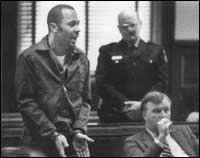
Willie Bosket, killer at age 15, is no longer an anomaly. The number of young boys committing violent crimes like rape and murder has increased dramatically in the 1990s, even as the murder rate for adults has declined. Criminologists predict that this will only get worse. Some state legislatures are making the age in which children are eligible for waiver into adult courts increasingly lower. Adolescents in Florida are on death row. In New York, 85% of the young people released by the Division for Youth are re-arrested. Prison has come to represent a rite of passage for some groups.
As a result, instruments for predicting dangerousness at younger ages-early enough to intervene and possibly prevent future crimes-have been developed and improved. Model programs have been put into place to help parents with parenting skills, and to alert communities to the need for coherence and vigilance.
For Willie, this all came too late. A few months after he was sentenced for stabbing the guard, he bashed another guard in the head, for which he received an additional life sentence. He then threw hot water in the face of another guard. He soon came to be known as the most dangerous criminal in the New York system, and was kept in a specially constructed isolation cell. The guards are forbidden to speak to him. He has no electrical outlets, no television or newspapers. Behind the bars of his cell is a sheath of plexiglass. Four video cameras keep him under surveillance at all times. Whenever he goes out, he is thoroughly shackled with an automobile tow chain. He feels he is on death row with no hope of escape in the electric chair. Sometimes he mourns the reckless violence of his youth, other times he feels sorry for himself and all those things in life that he missed. And because of him, the juvenile justice system will never been the same.
All Gods Children: The Bosket Family and the American Tradition of Violence, Fox Butterfield, New York: Avon, 1995.
Anderson, David. “Willie Bosket’s Rage,” The New York Times. May 14, 1989.
“An Overhaul is Urged, The New York Times, March 1, 1982.
“Bosket is Charged in Jail, Guard Attack,” The New York Times. April 6, 1989.
Brown, Richard Maxwell. Strain of Violence: Historical Studies of American Violence and Vigilantism. New York: Oxford University Press, 1975.
Butterfield, Fox. All God’s Children: The Bosket Family and the American Tradition of Violence. New York: Alfred A. Knopf, 1995.
–“A Boy Who Killed Coldly is now a Prison ‘Monster.'” The New York Times, March 22, 1989.
–“Caged for Life, and His Jailers Stand Back.” The New York Times. April 14, 1989.
–“Jailed ‘Monster’ gets more Prison Time for Stabbing Guard,” The New York Times. April 20, 1989.
“The City: Freed Killer of Two Seized as Robber,” Associated Press, March 21, 1984.
“Convicted Killer of Two Sentenced Again.” The New York Times, Oct. 16, 1984.
Gallanter, Martin. “Bosket’s Law: Trouble Sets Your Free,” The New York Times. April 21, 1989.
Glaberson, William. “Bosket Loses Federal Court Ruling over Being Shackled to Cell Door,” The New York Times. June 6, 1989.
“His Vicious Killings Change the law,” The New York Times, March 22, 1989.
Kaiser, Charles. “Youth Held in Two Murders asked for Placement in a Foster Home: Volunteer Offered Home.” The New York Times. July 20, 1978.
–“Subway Slayer’s Accomplice, 17, is Sentenced to Eight Years in Prison,” The New York Times, Aug. 2, 1978.
“Man Whose Killings Led to Tougher Laws is Convicted Again,” The New York Times, April 18, 1988.
Meislin. Richard. “Carey, in Shift, Backs Trial in Adult Court for some Juveniles,” The New York Times, June 30, 1978.
“Melee in Court ends with Lawyer’s Arrest,” The New York Times, July 12, 1984.
Quindlen, Anna. “Old Enough to Kill?” The New York Times, April 1, 1990.
“The Region: Bosket Recaptured after Goshen Escape” The New York Times, Dec 27, 1978.
“Sentencing is Delayed for ‘Monster’ Convict,” The New York Times, March 23, 1989.
Silver, Roy. “Alleged Rape by Freed Inmate, 17, Intensifies Criticism of State Aid,” The New York Times, July 22, 1978.
Smothers, Ron. “Two New York Lawyers, One Goal,” The New York Times. Feb. 27, 1987.
“With No Way Out, He Blames Prisons,” The New York Times, March 22, 1989.
